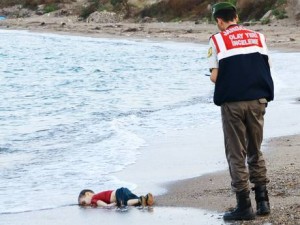Luke 3: 1-6
Advent 2C 2015
 All over the world, Christians are celebrating Advent, the season of preparation for the birth of Christ. And all over Christendom, the first three Sundays are occupied with readings about John the Baptist. Here we are, getting ready for the unreserved joy of angels, tinsel, carols, and the cheery glow of Christmas and in comes John–dusty, camel hair coat (not cashmere), reeking of locusts and honey. He smells of poverty and excessive discipline. He refuses to live in the big city, up at Jerusalem with the powerful and the educated, preferring instead the dust of the desert, a more fitting setting for his style of preaching. He was probably a member of the Qumran sect, the community that lived in the desert outside of Jerusalem and penned the Dead Sea scrolls. They were an austere, separatist bunch, who were awaiting a warrior like Messiah who would cleanse Israel of Rome.
All over the world, Christians are celebrating Advent, the season of preparation for the birth of Christ. And all over Christendom, the first three Sundays are occupied with readings about John the Baptist. Here we are, getting ready for the unreserved joy of angels, tinsel, carols, and the cheery glow of Christmas and in comes John–dusty, camel hair coat (not cashmere), reeking of locusts and honey. He smells of poverty and excessive discipline. He refuses to live in the big city, up at Jerusalem with the powerful and the educated, preferring instead the dust of the desert, a more fitting setting for his style of preaching. He was probably a member of the Qumran sect, the community that lived in the desert outside of Jerusalem and penned the Dead Sea scrolls. They were an austere, separatist bunch, who were awaiting a warrior like Messiah who would cleanse Israel of Rome.
The Church in its wisdom has always insisted that if you want to get to Bethlehem to see what’s in the manger, you must first confront this crazy prophet John out in the wilderness, who sermons are as bitter and harsh as the terrain. People sometimes think that John was active when Jesus was born because we look at these passages about him during Advent. But recall, he’s the same age as Jesus. Shortly after Mary knew she was pregnant she went to live with her cousin Elizabeth who was carrying John. So obviously because John comes before Jesus the Church (meaning the historic, universal church and those who put together the sequence of scriptures for Advent) must have wanted us to hear something.
John certainly does collide with what we have done to Christmas, doesn’t he? John’s gaunt, ruddy body fed with locusts and honey and draped with animal skins stands in stark contrast to a jolly fat elf fed on Christmas cookies and bologna sandwiches and dressed in a red velvet suit with a bag full of gifts for people who already have too much stuff.
![]() Did you ever wonder why none of our Christmas cards have John the Baptist on them? It might go like this: “Our thoughts of you at this special time of the year are best expressed in the words of John the Baptist, ‘ Repent! You brood of vipers! Who warned you to flee from the wrath to come? Merry Christmas.” You don’t find cookie cutters in the shape of John the Baptist; his figure isn’t in our crèche scenes; and hallmark cards have never featured him. You never see a John the Baptist Hummel. That’s because he upsets our Norman Rockwell images of Christmas of warm homes, happy families, and the ideal that the spirit of Christmas brings out the best in us all.
Did you ever wonder why none of our Christmas cards have John the Baptist on them? It might go like this: “Our thoughts of you at this special time of the year are best expressed in the words of John the Baptist, ‘ Repent! You brood of vipers! Who warned you to flee from the wrath to come? Merry Christmas.” You don’t find cookie cutters in the shape of John the Baptist; his figure isn’t in our crèche scenes; and hallmark cards have never featured him. You never see a John the Baptist Hummel. That’s because he upsets our Norman Rockwell images of Christmas of warm homes, happy families, and the ideal that the spirit of Christmas brings out the best in us all.
He reminds us that we are living as exiles in a wilderness and need to be called home. John the Baptist calls us to account for our lives, not by what nine out of ten Americans think, but by what God the Almighty thinks. John throws a cold, sobering blast of Jordan’s water in the face of our pretension, our delusions of grandeur, and our willingness to expect so little of ourselves.
The majority of today’s Gospel lesson is John the Baptist’s quote from the prophet Isaiah. This is poetry addressed to Jews in exile, in Babylon, which is about 59 miles SW of Baghdad. How did these people feel in exile? How did they respond to their captivity? If you imagine how you might respond if you were forced to spend extended time with people you don’t like, in a place you don’t like driven their by violence (much like today’s refugees) you won’t be far from their experience. Like Luke’s John the Baptist they remember Israel’s experience in the wilderness. The wilderness—midbar is the Hebrew: a desolate, lonely place, disorderly, dangerous, home of wild beasts. When Israel thought of wilderness it recalled Sinai, the pathless place where the Hebrew slaves, once freed, lost their way.
It’s no wonder why T.S. Eliot entitle his great poem to the modern world “The Wasteland.” So much of our culture is a wasteland, a desert, a fearful place, a wilderness. You never know who you might run into. You better carry a concealed weapon. There have already been 355 mass shootings this year. Refugees, men, women and children, fleeing from a brutal civil war looking for a fresh start in a safe land. Who knows what they might bring with them? Better build bigger, higher fences.

 By the way, what’s going on with Kim Kardashian? Is she still married to Kanye West? And Charlie Sheen; did you hear he has AIDS? Did you know Bruce Jenner is now Kaitlyn Jenner? And who knew that Starbucks was
By the way, what’s going on with Kim Kardashian? Is she still married to Kanye West? And Charlie Sheen; did you hear he has AIDS? Did you know Bruce Jenner is now Kaitlyn Jenner? And who knew that Starbucks was  really a front for an anti-Christian cabal? Didn’t you hear? They have only red cups, red mind you, with no snowflakes or Merry Christmas on them—just red! Such depth in our society! Wasteland indeed. In spite of it all, there’s a voice crying in the wilderness this morning.
really a front for an anti-Christian cabal? Didn’t you hear? They have only red cups, red mind you, with no snowflakes or Merry Christmas on them—just red! Such depth in our society! Wasteland indeed. In spite of it all, there’s a voice crying in the wilderness this morning.
Pliny the Elder, a Roman author, naturalist and philosopher once said that the Romans, when they couldn’t make a building beautiful, made it big. Sounds something like our culture, doesn’t it? If we can’t do it well, we do it bigger. We add dollars to our income, rooms to our houses, activities to our schedules, appointments to our calendars. And the quality or our life diminishes with each addition. We certainly have more food than we can consume, more high tech gadgets than we need, and more material resources than we deserve. And yet there is still widespread unhappiness. Many of our people still speak of a lack of fulfillment and despair. But, in spite of it all, there’s a voice crying in the wilderness.
We have our own personal wildernesses as well, don’t we? Perhaps your spouse or a child died a few years ago and you’re still wandering around feeling lost. Or perhaps that perfect job that you craved with all its perks and prestige has lost its luster—a lot of it. Or now that you’re old, you battle one ailment or ache or pain after another. My mother told me that after she turned 80 she feels like a used car with one part after another wearing out and needing to be fixed. It gets discouraging. Being a parent these days can be a wilderness experience at time as well. Is there any place in your life today that could be described as wilderness? Is the address where you live or work really feel like home? Or are there moments when you get the impression that you are not fully at home, that you are in exile, that there might be more to life that this?
It takes a certain degree of honestly to admit our yearning. After all, here we have freedom of choice. We are free to fashion our lives pretty much as we choose. If the lives we fashion are unfulfilling, who is there to blame but ourselves? Therefore, we are reluctant or embarrassed to admit our sense of unfulfillment, our hungry hearts, that dawning sense that there must be more than this.
 All of which makes it rather remarkable what we do here in church at this time of the year. Advent is a season of yearning, of waiting. Think of the hymns we sing during Advent. They are somewhat restrained. They speak of desire, of waiting, or expectation. “O Come, O Come, Emmanuel.” The Advent prophets all speak to a people in exile, a people suffering from homeless and despair.
All of which makes it rather remarkable what we do here in church at this time of the year. Advent is a season of yearning, of waiting. Think of the hymns we sing during Advent. They are somewhat restrained. They speak of desire, of waiting, or expectation. “O Come, O Come, Emmanuel.” The Advent prophets all speak to a people in exile, a people suffering from homeless and despair.
John the Baptist’s voice is that of one “crying in the wilderness.” In order to hear John’s cry, one must be in a wilderness. I suppose it is an axiom of our faith that it is difficult to be found unless you are first lost. It is impossible to be saved until you are damned. It is tough to receive a gift if you already have everything. You can’t be satisfied if you have no hunger. It takes a certain amount of courage and conviction to admit to yearning. In order to see the fragile light at Christmas, one has first got to become accustomed to the dark. In order to see the stars in the highest heavens, one must sit for a while in the darkness here on earth. Are you up to such honesty?
 When you are in exile, in a wilderness patch in your life, you really only have one of two choices: Will I focus my attention on what is wrong with the world and my life and feel sorry for myself? Or will I focus my energies on how I can live at my best in the place where I find myself? This is not to say that yearning is not a call to act, to do something different, to hitch your wagon to a star, but until that happens you’ve got to wait. All of us are given moments, day, months, and years of exile. What will we do with them? Wish we were someplace else? Grumble? Escape into fantasies? Watch a lot of porn on the internet? Drink and drug ourselves into oblivion? Wilderness experiences strip away all that is superfluous and we find the essentials—our life in God. William Falkner once said, “It’s hard believing, but disaster seem to be good for people.” I know that whenever I’ve gone through hell I don’t like it, but I like the person I’ve become on the other side.
When you are in exile, in a wilderness patch in your life, you really only have one of two choices: Will I focus my attention on what is wrong with the world and my life and feel sorry for myself? Or will I focus my energies on how I can live at my best in the place where I find myself? This is not to say that yearning is not a call to act, to do something different, to hitch your wagon to a star, but until that happens you’ve got to wait. All of us are given moments, day, months, and years of exile. What will we do with them? Wish we were someplace else? Grumble? Escape into fantasies? Watch a lot of porn on the internet? Drink and drug ourselves into oblivion? Wilderness experiences strip away all that is superfluous and we find the essentials—our life in God. William Falkner once said, “It’s hard believing, but disaster seem to be good for people.” I know that whenever I’ve gone through hell I don’t like it, but I like the person I’ve become on the other side.
So here is the Good News this second Sunday of Advent. To those who live in exile, in the wilderness, lost, wandering—God is making a way. You heard John the Baptist: “Every valley shall be filled, and every mountain and hill shall be make low, and the crooked shall be made straight, and the rough ways made smooth.” God is making a way through your desert, through our desert, a highway strait to you. Keep looking, keep yearning and maybe, just maybe, this Advent you shall see “the salvation of God.”
